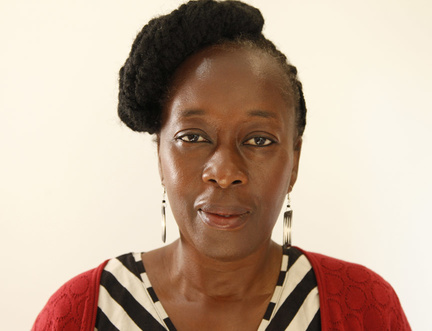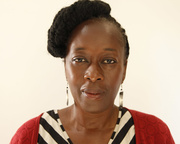On Freedom
By Yaba Badoe

In 2018, we commissioned 51 authors from 25 countries to write essays exploring ideas about freedom for The Freedom Papers, a publication produced in partnership with Gutter Magazine. Read on for Yaba Badoe's essay, and visit guttermag.co.uk to purchase a copy of The Freedom Papers.
I belong to a generation of Africans born as a wave of nationalist movements on the continent which led to independence in the 60s. I’m from Ghana, formerly the Gold Coast, the first African nation to break free from colonial rule. My generation grew up with a belief that having broken with our colonial past, we were forging a bright, new future for ourselves. In my case, the nationalist dream I inherited from my parents was that in order for our part of Africa to catch up with the West, my brother and I, the two eldest children in our family, would be sent away to obtain the best education money could buy – a British education, of course!
Despite the contradictions of the path my parents set me on, they imbued me with a pride that surfaces whenever I consider the word ‘freedom’ in relation to Ghana. At the midnight hour when the red, gold and green horizontally striped flag of Ghana, the black star of freedom at its centre, was raised for the first time on the 6th March 1957, Ghana’s first Prime Minister, Kwame Nkrumah, said: ‘At long last the battle has ended, and thus Ghana, our beloved country, is free forever.’ He went on to say that Ghana’s independence was meaningless unless it was linked to ‘the total liberation of Africa.’ So, right from its inception, our destiny was entwined with a much larger pan-African vision that embraced the wellbeing of Africans everywhere.
The day after independence my father, who’d recently returned to Ghana after training and qualifying as a doctor and surgeon in Britain, went out on the upstairs balcony of his government bungalow with an old friend. They took in the view of the Gulf of Guinea, a part of the Atlantic that flows along a coastline scarred with the ruins of former slave castles. As he looked out that day, my father firmly believed that Ghana had the potential to become a paradise on earth. ‘We had everything,’ he once told me. ‘Human talent, mineral and financial resources – the future was ours.’
Yet back then, he was one of only two qualified doctors working in the whole of the Central Region of Ghana, an area inhabited by over 700,000 souls. My father worked 24/7. Many pre-independence professionals did.
As events unfolded, the nation that would have ‘freedom forever’ and become ‘a paradise on earth’ didn’t materialise as Nkrumah and my father had imagined. After a referendum, Prime Minister Nkrumah changed the country’s constitution to become president of the Republic of Ghana. He went on to win another referendum with a stonking 99.9% of the vote a couple of years later; a referendum that turned Ghana into a one-party state and made him President for life. The road to freedom was not going in the direction my parents had hoped for. Nevertheless, in those early days of independence, the foundations of medical care in Ghana were laid out, as were plans for a teaching hospital to train doctors at the country’s largest hospital, Korle-bu. My father was one of the founding fathers of the University of Ghana Medical School.
In 1966, aged eleven, in my last year at a Devon prep school, Nkrumah was deposed in a coup d’état. Some say that the CIA helped to orchestrate it. After all, they were not alone in being spooked by Nkrumah’s support for liberation struggles across the continent.
By the time I returned to Ghana to work at the Ministry of Foreign Affairs in the late 70s, the country was in the throes of yet another period of military rule. The National Liberation Council that had usurped Nkrumah had ceded power to an elected civilian government led by Kofi Abrefa Busia in 1969. Eighteen months later, Busia was overthrown.
We lived through coups, counter-coups, blatant corruption and the gross mismanagement of Ghana’s economy. All the while, as my father persevered in editing the first locally produced pan-African surgical textbook for Ghanaian students, now being revised for its 5th edition, everyone fretted about a rising cost of living exacerbated by a 300% rate of inflation.
I remember my Grandmother, Maadi, confessing to me that if she had her way, she’d be happy for the British to return to run our affairs again. Why? I asked. ‘Because when the British were in charge,’ she replied, ‘I could afford to buy a tin of corned beef. Now, I can’t.’
I didn’t agree with Maadi, but I understood what she meant, for I was beginning to question where my loyalties lay too. Making our own mistakes on the road to freedom was all very well, but when I realised that for most of my colleagues the best part of a diplomat’s job was the foreign exchange we earned while posted abroad, I wondered if working in Foreign Affairs was for me. Being paid in sterling, dollars or Deutsch-marks made it easier to buy everyday items such as cookers, fridge/freezers and cars at a more reasonable price than in Ghana. But was I willing to wait five years before being posted abroad when, if I moved to London, I could have a roof over my head quickly? Not surprisingly, my commitment to the hard grind of everyday life in Ghana faltered.
A house coup within the Supreme Military Council led to a violent army mutiny in 1979 in which three former heads of state were executed by firing squad by the Armed Forces Revolutionary Council. My boss, the Minister of Foreign Affairs, Colonel Felli was also executed to ensure the ethnic diversity of those culled.
We then had de-facto army rule, which mutated in 1992 into the government of the National Democratic Congress, when multi-party politics was reintroduced in the Fourth Republic. By then I’d bailed out of the nationalist dream, had made London my home, and was working as a director of documentary films for the BBC. I was part of a massive brain drain out of Africa, out of Ghana specifically, where doctors trained at the Medical School found homes in Britain, Europe, America, Canada and Australia.
Ghana’s brief history as a nation illustrates the point I’m forced to reflect on whenever I think of freedom. In much the same way that Bette Davis said old age is no place for sissies - the struggle for national self-determination in a world in which terms of trade between rich and poor countries operate to the detriment of the poor - is not for the faint-hearted. With his reputation for excellence my father could have lived anywhere he wanted. With the boundless support of my mother, he chose the hard graft of working for the freedom of the country he loved by training doctors in Ghana. I admire his choice.
Copyright © 2018, Yaba Badoe. All rights reserved.
Supported by the Scottish Government’s Edinburgh Festivals Expo Fund through Creative Scotland.


 Major new partnership with Celtic Connections
Major new partnership with Celtic Connections 

